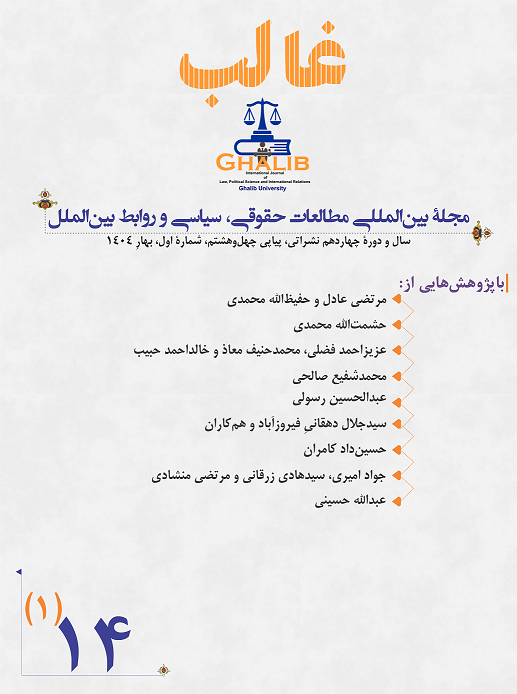Basic Principles of Commercial Mediation in the Laws of Iran and Afghanistan
(Based on the Singapore Convention, 2019)
DOI:
https://doi.org/10.58342/ghalibqj.V.14.I.1.2Keywords:
principles of mediation, commercial mediation, fundamental principles of conciliationAbstract
Mediation is one of the methods of resolving disputes outside the courts, which is often preferred by both parties for various reasons. In the commercial sphere, this dispute resolution method is widely utilized by business entities. The success and enforceability of an agreement resulting from mediation depend on the recognition and adherence to the fundamental principles of commercial mediation by both the mediator and the disputing parties. However, to date, no comparative study has been conducted on the principles of commercial mediation in the legal frameworks of Iran and Afghanistan. This article aims to identify and analyze the key principles of mediation to enhance the mediation process and prevent challenges to the enforceability of mediation agreements. Adopting a descriptive-analytical approach, this study conducts a comparative analysis of the fundamental principles of mediation under the laws of Iran, Afghanistan, the Singapore Convention (2019), and the UNCITRAL Model Law (2018). The findings reveal that the principles of autonomy, independence, impartiality, good faith, and confidentiality constitute the core principles of mediation under the laws of Iran, Afghanistan, and the UNCITRAL Model Law. These principles play a crucial role in the mediation process, and their violation can lead to the termination and failure of mediation. In some cases, breaches may even result in civil and criminal liability. However, the principles of autonomy and confidentiality are subject to certain limitations and exceptions, which are discussed in this study. Ultimately, the results of this research can assist legal practitioners and commercial mediators—particularly in the Iranian and Afghan legal contexts—in optimizing the mediation process and ensuring the validity of mediation agreements.
References
اسکینی، ربیعا؛ نیازیِ شهرکی، رضا. (1386). «مفهوم اصل حسننیت و رفتار منصفانه». نشریۀ حقوقی گواه. (10). 3-21. http://noo.rs/bQTAR
افضلی، عبدالواحد. (1399). «حلوفصل اختلافات ناشی از سرمایهگذاری». کابل: بنیاد اندیشه (مجله چاپی).
جنیدی، لعیا. (1378). بررسی تطبیقی قانون نمونه. تهران: دانشگاه تهران.
درویشیِ هویدا، یوسف. (1393). شیوههای جایگزین حل و فصل اختلاف. چ دوم. تهران: میزان.
رحیمزاده و همکاران. (1398). روشهای حل منازعات تجارتی. کابل: وزارت تحصیلات عالی افغانستان.
شمس، عبدالله؛ بطحائی, سیدفرهاد. (1396). «معیار تشخیص استقلال و بیطرفی داور». فصلنامة تحقیقات حقوقی. 20(77). 39-65. https://lawresearchmagazine.sbu.ac.ir/article_56506.html
شیروی، عبدالحسین. (1391). داوری تجاری بینالمللی. تهران: سمت.
عادل، مرتضی؛ توکلی، محمدمهدی. (1392). «استقلال و بیطرفی داور در داوری داخلی و داوری تجاری بینالمللی». تحقیقات حقوقی. 16(64). 191-216. http://noo.rs/UJwqh
عمید، حسن. (1375). فرهنگ فارسی. چ ششم. تهران: انتشارات امیرکبیر.
کاتوزیان، ناصر؛ عباسزاده، محمدهادی. (1392). «حسن نیت در حقوق ایران». مطالعات حقوق خصوصی. 43(3). 167-186. https://dor.isc.ac/dor/20.1001.1.25885618.1392.43.3.10.6
کریمی، عباس؛ پرتو، حمیدرضا. (1393). حقوق داوری داخلی. چ سوم. تهران: نشر دادگستر.
کریمی، عباس؛ سلیمیان، اباالفضل. (1400). «تعهد حسننیت در قراردادها در حقوق ایران و فرانسه». فصلنامة تمدن حقوقی. 4(8). 234-248. https://www.pzhfars.ir/article_132723.html
معین، محمد. (1386). فرهنگ فارسی. تهران: انتشارات امیرکبیر.
واحد، شقایق؛ معبودیِ نیشابوری، رضا. (1394). «استقلال و بیطرفیِ داور؛ ترادف یا تمایز؟ (مطالعۀ تطبیقی در داوری تجاری بینالمللی)». مطالعات حقوق تطبیقی. 6(1). 393-412. https://dor.isc.ac/dor/20.1001.1.1735496.1394.6.1.18.7
Stephan, B. (2020). International Commercial Arbitration, Hart Publishing Oxford Beck Juristischer Verlag Dez.
The United Nation Convention on International settlement Agreements Resulting From Mediation, 2019 Singapore.
References
Aadel, Morteza; Tavakoli, Mohammad Mahdi. (2013). "Independence and Impartiality of the Arbitrator in Domestic and International Commercial Arbitration." Legal Research, 16(64), 191-216. http://noo.rs/UJwqh [In Persian]
Afzali, Abdulwahid. (2020). "Resolution of Disputes Arising from Investment." Kabul: Andisheh Foundation (Printed Journal). [In Persian]
Amid, Hassan. (1996). Persian Dictionary. 6th edition. Tehran: Amir Kabir Publishing. [In Persian]
Darvishi-e Hovida, Yousef. (2014). Alternative Dispute Resolution Methods. 2nd edition. Tehran: Mizan. [In Persian]
Janidi, Laya. (1999). Comparative Study of the Model Law. Tehran: University of Tehran. [In Persian]
Karimi, Abbas; Parto, Hamidreza. (2014). Domestic Arbitration Law. 3rd edition. Tehran: Dadgostar Publishing. [In Persian]
Karimi, Abbas; Salimian, Abolfazl. (2021). "The Obligation of Good Faith in Contracts in Iranian and French Law." Legal Civilization Journal, 4(8), 234-248. https://www.pzhfars.ir/article_132723.html [Persian]
Katouzian, Nasser; Abbaszadeh, Mohammad-Hadi. (2013). "Good Faith in Iranian Law." Private Law Studies, 43(3), 167-186. https://dor.isc.ac/dor/20.1001.1.25885618.1392.43.3.10.6 [In Persian]
Mo'in, Mohammad. (2007). Persian Dictionary. Tehran: Amir Kabir Publishing. [In Persian]
Rahimzadeh et al. (2019). Methods of Commercial Dispute Resolution. Kabul: Ministry of Higher Education, Afghanistan. [In Persian].
Shams, Abdullah; Botahi, Seyed Farhad. (2017). "Criteria for Determining the Independence and Impartiality of Arbitrators." Legal Research Quarterly, 20(77), 39-65. https://lawresearchmagazine.sbu.ac.ir/article_56506.html [In Persian]
Shirovi, Abdulhossein. (2012). International Commercial Arbitration. Tehran: Samt. [In Persian]
Skini, Rabia; Niazi-e Shahraki, Reza. (2007). "The Concept of the Principle of Good Faith and Fair Behavior." Gavah Legal Journal, 10, 3-21. http://noo.rs/bQTAR [In Persian]
Stephan, B. (2020). International Commercial Arbitration, Hart Publishing Oxford Beck Juristischer Verlag Dez.
Vahid, Shaghayegh; Ma'budi-e Nishabouri, Reza. (2015). "Independence and Impartiality of the Arbitrator; Synonym or Distinction? (A Comparative Study in International Commercial Arbitration)." Comparative Legal Studies, 6(1), 393-412. https://dor.isc.ac/dor/20.1001.1.1735496.1394.6.1.18.7 [In Persian]
The United Nation Convention on International settlement Agreements Resulting From Mediation, 2019 Singapore.
Downloads
Published
How to Cite
Issue
Section
License
Copyright (c) 2025 مرتضی عادل،حفیظ الله محمدی

This work is licensed under a Creative Commons Attribution 4.0 International License.













